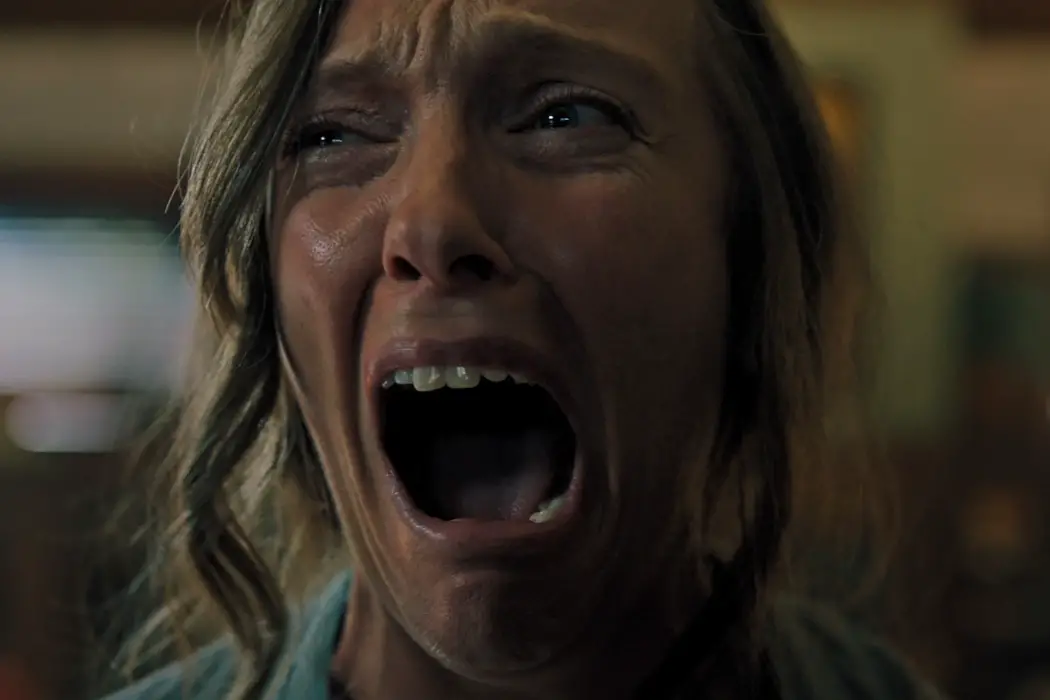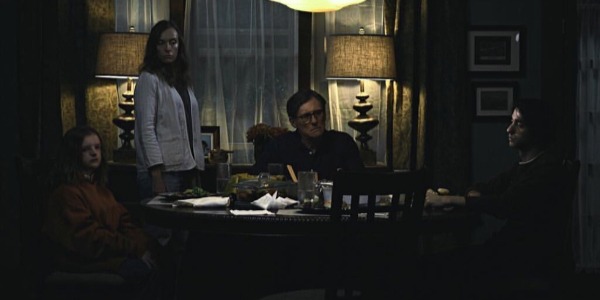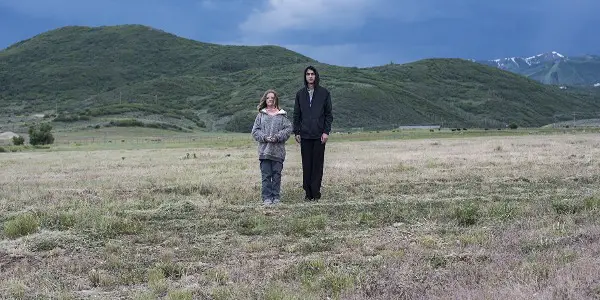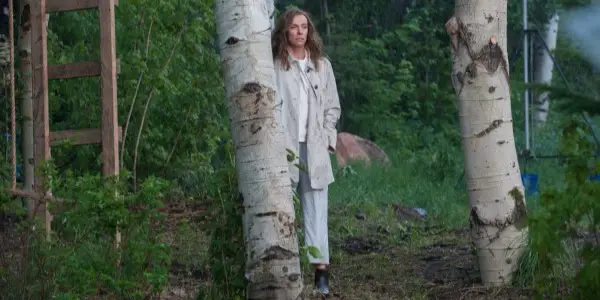HEREDITARY: A Confident, Provocative Debut That Offers Nothing Below The Surface

Alistair is a 25 year old writer based in Cambridge.…
In 2011, Ari Aster’s debut short film The Strange Thing About the Johnsons became a minor internet sensation due to its controversial subject matter — a darkly comic study of an African American family where the son sexually abuses his father. Although the short is in the same vein as numerous Adult Swim skits, where horror and comedy at their most extreme intertwine, it still managed to generate a significant amount of publicity for a cult item from a first time director. Was his horrifying short an offbeat social commentary, dealing with the topic of race in America with one of the more offensive allegories imaginable?
A Thematically Empty Provocation
The answer was, quite obviously, no. Aster conceived the film based on a desire to tell a story about the most ludicrous, yet offensive, concept imaginable, with the African American cast a byproduct of him casting a friend in the lead role. But this didn’t stop people trying to find deeper meaning in a film designed entirely as a black comic provocation – something designed to shock you, not reach for a laptop to pen a 1,000 word thinkpiece on the apparent meaning behind it. A handful of shorts later, and his feature debut Hereditary has arrived to mass fanfare; many are declaring it one of the scariest films ever made, and it’s even generated Oscar talk this early in the game.
And yet, just like his earlier short, Hereditary feels like nothing more than a provocation, updating the parental anxieties of Rosemary’s Baby for the modern era — and adding no substantial allegory that makes it feel any deeper than this. Aster is a very technically precise filmmaker, and on that level, this is one of the most accomplished debuts of recent memory; he can get stellar performances from his entire ensemble, and ensures they are integrated perfectly into the oppressive atmosphere he’s conjured up.
But this is a film that’s all atmosphere, with the broad themes of marriage, parenthood and religion all thrown in with very little, if anything, to say about any of them. The lack of deeper meaning would be fine, of course, were this not a film that (for the most part) takes itself way too seriously, even as it moves in a direction closer to Blumhouse than Polanski.
The terrific Toni Collette stars as Annie, an artist who has suffered the recent loss of her mother following a long battle with cancer. She openly admits to not being able to process the news properly — at one point, she even asks her husband Steve (Gabriel Byrne) whether she should be sadder. The pair live with their two children, stoner high schooler Peter (Alex Wolff) and Charlie (Milly Shapiro), their tween daughter with an unspecified disability.

Days later, Steve gets the unexpected news that Annie’s mother’s grave has been dug up, and Charlie starts to act increasingly strange — frequently wandering off into the garden following some mysterious presence, in spite of her shy reserve. Elsewhere, after returning to a grief counseling class she initially attended after her mother passed away, Annie meets Joan (Ann Dowd), who leads her to a new stage in the grieving process that has drastic consequences for the mental and physical wellbeing of the entire family unit.
Hereditary’s tonal inconsistency and lack of thematic depth stops it from ever being scary — but that isn’t to say it doesn’t impress in many other departments. Aster has a precise command of the film’s visuals, with a meticulous production design reminiscent of Wes Anderson; in the finest moments, he uses small details in the film’s design to foreshadow later plot points, be they a diary in the daughter’s bedroom or a lingering shot of a letter about spirituality being forced through a letterbox. His style is also far removed from the stylistic hallmarks of jump-scare horror. He prefers to linger on a long take, soaking up the reaction of his actors in extreme close-up, a method which proves to be more unsettling than any of the directly supernatural elements.
Self-Serious or Camp?
The first two-thirds of the film often feel like Michael Haneke has made a supernatural horror — and by pure coincidence, Colette’s character is named Annie, whereas Haneke names almost all of his female characters Anne. It could be argued that this is a similarly twisted satirisation of a bourgeois family in crisis, but again, it doesn’t really hold that thematic weight; the family’s large house seems to have been designed purely for its unsettling visual qualities, more than to signify anything deeper about the family itself.

(The following two paragraphs refer to an event that takes place around the 30 minute mark. If you don’t want to have this event spoiled, skip ahead.)
In fact, the only area that the film holds any substantial provocative weight is in its suggestion that a disabled character is a natural source of horror, and this is only provocative due to how misjudged it frequently feels. Shapiro’s Charlie is the first character to witness any otherworldly occurrences, and as she continues to haunt the family after her first-act passing, it’s hard to escape the feeling that Aster made the spectre that haunts (both literally and figuratively) the family disabled because it would directly play into audience prejudices.
I’m hoping this isn’t the case, but considering this is a man whose first short film was about a son sexually abusing his father, made purely because he wanted to tell the most offensive story possible, I’m not sure whether to give this the benefit of the doubt. It doesn’t expose audience prejudice so much as it shows that he isn’t above using outdated thematic ideas in his quest to unsettle. This isn’t a fault of Shapiro’s performance, her first film role after playing Matilda in the recent Broadway musical, so much as it is a fault of Aster’s for creating a character with an unspecified disability and proceeding to make her the film’s ghostly presence with no depth beyond this.
By the time we get to the third act, the film is held together entirely by Aster’s command of the camera and the strength of the three central performances, because the story becomes increasingly tonally inconsistent. The oppressive, Haneke-lite atmosphere of the earlier stages is suddenly exchanged for an unexpected dose of camp that undermines everything that came before it. I have no problem with the change in tone, in theory — but unlike a film such as Darren Aronofsky’s mother!, there’s no prior indication that the tone is evolving with the story.

Anybody sold by this being “The Exorcist for a new generation” will be left scratching their heads as a slow burning psychological thriller becomes unashamedly goofy. However, I am admittedly curious as to how the film would play with this prior knowledge; the story reaches its natural conclusion, even if the tight command of tone is significantly loosened.
Hereditary: Conclusion
Ari Aster only has plans to make one more horror film following Hereditary, which is something of a relief. His debut is proof that he’s a technically accomplished director, who knows how to get stellar performances from his cast – but due to an unfortunate tendency for needless (and fairly thematically empty) provocation when it comes to choosing subject matter, moving in a lighter direction might suit him well, and help him counter his worst instincts.
Hereditary is tonally messy, but the hallmarks of a great director are shown here. Hopefully his sophomore feature will fulfill the promise of this debut.
Hereditary is released in the US on June 8, and in the UK on June 14.
Does content like this matter to you?
Become a Member and support film journalism. Unlock access to all of Film Inquiry`s great articles. Join a community of like-minded readers who are passionate about cinema - get access to our private members Network, give back to independent filmmakers, and more.
Alistair is a 25 year old writer based in Cambridge. He has been writing about film since the start of 2014, and in addition to Film Inquiry, regularly contributes to Gay Essential and The Digital Fix, with additional bylines in Film Stories, the BFI and Vague Visages. Because of his work for Film Inquiry, he is a recognised member of GALECA, the Gay & Lesbian Entertainment Critics' Association.













